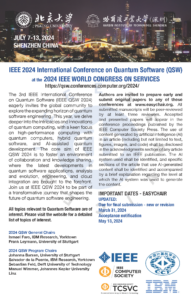Call for Papers
The 3rd IEEE International Conference on Quantum Software (IEEE QSW 2024) eagerly invites the global community to explore the expanding horizon of quantum software engineering. This year, we delve deeper into the intricacies and innovations of quantum computing, with a keen focus on high-performance computing with quantum computers, hybrid quantum software, and AI-assisted quantum development. The core aim of IEEE QSW 2024 is to foster an environment of collaboration and knowledge sharing, where the latest developments in quantum software applications, analysis and evolution, engineering, and cloud integration are brought to the forefront. Join us at IEEE QSW 2024 to be part of a transformative journey that shapes the future of quantum software engineering.
All topics relevant to Quantum Software are of interest including, but not limited to the following:
Hybrid Quantum Software
Architectural Styles of Hybrid Quantum-Classical Applications
Architecture Blueprints for Hybrid Quantum-Classical Applications
Best Practices and Patterns for Hybrid Quantum-Classical Applications
Integration and Orchestration of Quantum/Classical Components in Hybrid Applications
Specification & Verification of Functional/Non-functional Requirements of Hybrid Applications
High Performance Computing with Quantum Computers
Impact of Hybrid Quantum-Classical workflows on HPC architectures
HPC architectures for leveraging Hybrid Quantum-Classical workflows
Quantum-Classical Information Hybrid Payloads
Lifecycle of HPC Quantum-Classical Hybrid Applications
AI-Assisted Quantum Development
AI-Based Circuit Optimization and Synthesis
AI-Assisted Error Mitigation Techniques
AI-Powered Execution of Quantum Circuits
Limits of AI-Powered Simulation of Quantum Computers
AI-Driven Unitary Synthesis
Quantum Software Applications
Migration from Proof-of-Concept Quantum Applications to Production
Scalability of Quantum Applications (e.g., sensitivity of increasing qubits, gate fidelity)
Migration between different Quantum Technologies
Software-perspective Experience Reports of Applying Quantum Technologies
Best Practices and Patterns for Quantum Applications
Quantum Software Analysis and Evolution
Quantum Software Analysis and Mining
KPIs and Quality Metrics for Quantum Applications
Evolution and Re-engineering of Quantum Applications
Quantum Software Visualization and Comprehension
Quantum Software Maintenance, Repair, and Improvement
Quantum Software Development
Development Process for Quantum Applications
Lifecycle Models for Quantum Applications
Data Preparation and Error Mitigation Techniques
Testing of Quantum Applications
Quantum Software Languages, Code Generators, Compilers, and Simulators
Quantum in the Cloud
Quantum Computing as a Service
Interoperability and Portability of Quantum Software
Deployment Automation of Quantum Software
Cloud-based Quantum Software Development Environments
Quantum Software Performance and Benchmarkin






